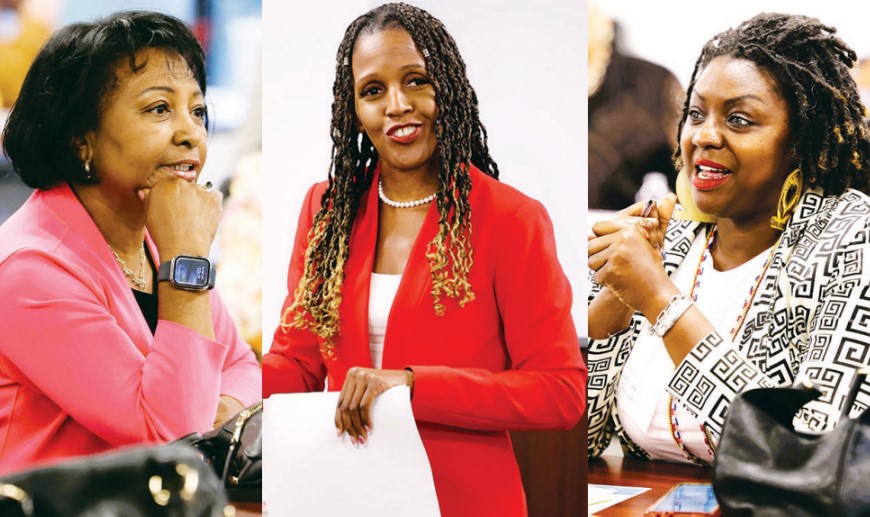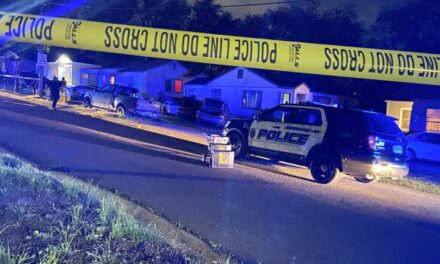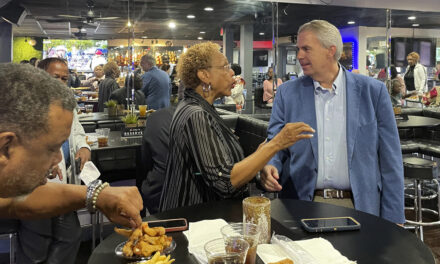By Aria Brent,
AFRO Staff Writer,
abrent@afro.com
Maryland Public Defender Natasha M. Dartigue is making major moves to ensure that minority mothers and children are receiving equal access to justice across the state of Maryland. On Sept. 26, CEO and publisher of the AFRO, Dr. Frances “Toni” Draper, invited women leaders to meet and speak with Maryland’s first Black public defender. The women came together to discuss criminal justice reform for those who need it most– the Black and Brown children of Maryland.
“It’s about remaining engaged and informed,” said Dartigue, at the event. “What we’re seeing now is a lot of fear feeding into the hearts and minds of people. Once people are fearful they are extremely reactionary.”
Dartigue shared some of the experiences she’s had throughout her personal and professional life and explained how they’ve fueled her passion for helping women and children in marginalized communities.
“I grew up in an era where there was a village that looked out for me- but that was in a village where the village knew what was ‘right,’” she said.
Dartigue is a mother of two and has been a single mother since her eldest child was eight years old. She recognizes that there is a need for more to be done for the women who support the Black and Brown children in the community.
“I thought about what more we could do for the moms in our community,” explained Dartigue. “When I talk about moms I‘m not only talking about women who have given birth to children. I’m talking about all of the [women] that come together to support our community.”
Community leaders from organizations such as Life After Release and the National Coalition of 100 Black Women (NCBW) came out to network, share information on the services of their organizations and brainstorm solutions to challenges facing the Black criminal justice reform. They also discussed solutions that need to be implemented to help resolve the issue of Black mothers and women being underrepresented in legislative settings.
“I really do believe that this is a community engagement effort and that we need to reach out to all aspects of our community–our church leaders, our sororities and fraternities– and all of our social organizations to bring about change,” said Michelle McNeilll-Emery, president of the Baltimore Metropolitan Chapter of the National Coalition of 100 Black Women. “We all have a voice and it’s important that we use our voices for people who may not know how to enter certain doors. We have those people that are legislators and elected officials in our organizations and we need to go to them and say ‘we need to make some change.’”
Dartigue shared similar sentiments, noting that people in marginalized communities have been voicing their need for help–but nobody has been listening. She went on to note that she and members of the Maryland Office of the Public Defender are looking to amplify the voices of those who have gone unheard for so long.
“What we continue to do is amplify the voices of the community. Our community has always had a voice– we were not being listened to,” said Dartigue. “We are essentially amplifying the voices of those individuals in the Black and Brown community–the marginalized members of the community.”
When it comes to public safety in the Black community, Dartigue said there are already models of successful, thriving communities in Maryland.
“When you think about it, the communities that are safest- what do they have?” she quipped. “Affluent communities don’t have a police officer on every corner– they don’t have blue lights. They have good schools and supermarkets, places where people can get adequate healthcare.”
Adding that “if we really want to talk about how to improve public safety we have to address those issues,” Dartigue says leaders “have to address the issue of mental health in our children- the things that they have seen and experiences they should have never experienced as children.”
She then shared several basic truths to be mindful of when talking about children, such as the fact that there are no in-patient substance abuse beds for children, there aren’t enough shelter beds for children experiencing homelessness and Black children are 30 percent of the population, but 50 percent of the children in foster care.
Dartigue discussed several other truths related to the Black family. She said that Black women disproportionately interact with Child Protective Services, causing trauma that makes children more likely to repeat a grade, drop out of high school, develop a substance abuse issue problem or have contact with the justice system.
“You can get an allegation of neglect if it’s winter, it’s cold outside and your child has no coat–as opposed to just giving the family the services and support that they need,” said Dartigue.
Calling people to action, the Maryland public defender stated that now is the time to organize and take action.
“With all the news about young people committing crimes, now they’re [asking], ‘Do you think we are at that point where we will start to see young people mass incarcerated?’” said Dartigue.” You need to notice who is making the call to lock up children. We need to speak up and defend children.”
Dartigue also shared three things that can be done to help empower our Black and Brown communities.
“Be an advocate of the Office of the Public Defender,” she said. “What that looks like is you tracking legislation that is important to your organizations or community. Join us in Annapolis when your legislation is being debated. Give to our foundation. Join us on social media or share our pages.”
Dartigue said that people can help by pulling together people they interact and socialize with around a common cause.
“Make public defense central to your particular organization or agency,” she suggested. “Another way to make public defense central is to host a screening of the Netflix documentary ‘13th.’” In your book club, share the text “The New Jim Crow” to discuss the impact of crime bills introduced in the early 1900’s.”
As a third recommendation to make change, Dartigue said that advocates and allies should “consider establishing a standing committee that works on juvenile justice issues.”
“It could be an informational session to inform your members, it could be an expungement fair,” she said. “These are ways in which you could stay connected, engaged, informed and empowered.”
Dartigue invited out a very specific demographic of women who she recognized as being both in need of resources and also capable of helping resolve the issues discussed. The room was filled with women who were interested in bringing change to their communities. Although the subject matters covered that afternoon were heavy, the conversation ended with a 15-minute break out session to focus on solutions.
Draper noted the importance of having quality partners and allies in the room for the event, “It’s not about having 300 people in the room, it’s about having the right people in the room,” she said.
The post Natasha M. Dartigue discusses issues affecting minority mothers and children at recent AFRO event appeared first on AFRO American Newspapers .











